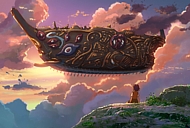
Children Who Chase Lost Voices From Deep Below
The problem with hype and expectations is that disappointment is almost inevitable. The summer of 2013, for me, has been a series of movies that have almost but not quite lived up to my hopes. Pacific Rim, Star Trek: Into Darkness, Man Of Steel...all good movies that I'd hoped would be great. Yet each is also, strangely, a letdown. I'll see them again with my boys someday and enjoy them. But there's a nagging sense that they should have been more.
I've had a copy of Children Who Chase Lost Voices From Down Below since Christmas. Makoto Shinkai had released three of my favorite movies. He is, in fact, the only director to date to have a perfect track record here at The Anime Review...his works have each scored an A+ from me. So why did I wait eight months to watch it? Simply put, I was worried about what I'd find. Early reviews said it was still decent, but perhaps Shinkai's first misfire. Some mentioned it was slow -- does Makato Shinkai make any other kind of movie? -- and others that it wasn't as creative. I delayed because I just didn't want the dissatisfaction of another film that was good instead of great.
Now I'm kicking myself because I could have found my way back to this movie a half-dozen times since then. Children Who Chase Lost Voices is magnificent. It is stunning, beautiful, heart-rending, and almost spiritual. Maybe I'm over-reacting to the criticism, but I loved it...and it doesn't hurt that it's not only an homage to animation emperor Hayao Miyazaki, but in some ways, the student has become the master.
Children is the story of Asuna, a sweet and sharply intelligent girl whose bright demeanor betrays a lonely life. Her father died when she was very young, and her mother has thrown herself into a nursing job that takes up virtually all her waking hours. Asuna spends most of her time away from school alone, listening for signals through a radio device hooked up to a crystal given to her by her dad. Recently, she's heard strange, otherworldly music, haunting and beautiful. But danger lurks nearby...a bear has been spotted roaming the area, and she encounters it on the train trestle she walks every day. Only it's no bear...and her rescuer is no ordinary teenage boy.
After a daring escape, she becomes friends with Shun, a bold and kind young man who shows an interest in her. But her happy times with him are soon to end, and Asuna comes face to face with loss again. But that loss will lead her on an adventure to another world, one of ancient ruins and even older peoples, a place where legends say the dead can be brought back to life...for a price.
The world of Children is gorgeous and haunting. It's also directly linked to the world of Hayao Miyazaki. Creatures appear that would be at home in Nausicaa and Spirited Away; the characters and the plot owe a debt to Castle In The Sky; the nature scenes are reminiscent of My Neighbor Totoro; its dark tone and dwellers in the underworld land spring from Princess Mononoke. It's the kind of film where multiple viewings will likely yield additional connections to the films of Studio Ghibli. And while Shinkai's work is known for its unique beauty and color palette, here he seamlessly blends his own worlds with the worlds of Miyazaki. The Blu-Ray from Sentai Filmworks looks nothing short of jaw-dropping.
But before you think that this is just Shinkai aping Miyazaki, Shinkai is interesting in mining different subject matter than the elder animation statesman -- and a change from his normal forte. Shinkai's first three works are about relationships over time and distance; each one has a significant romantic connection that holds the whole together. While Children does have hints of the nostalgic melancholy he's known for -- after all, this film is set in rural Japan of the '70s; how can it not be nostalgic? -- that's not its primary chord.
Instead, Children is more of a treatise on death, loss, and regret. The loneliness the characters of Children feel isn't due to romantic entanglements gone south but hearts broken over those who've died. Not only is this what separates this tale from the stories of Miyazaki that inspired it, it's also why it has divided critics. Many anime viewers are young; they can relate to romance far more than death. (While I disagree with her review, I'm glad that Bamboo Dong over at Anime News Network said as much in her piece on the film.) But it is that very story element that makes Children such a powerful movie, and one that haunts more than your typical Ghibli tale. But strangely enough, I think many pre-teens could relate to this story...particularly if they aren't coming in with expectations from Shinkai's previous movies.
In fact, despite the shift into more mature subject matter, Children is full of wonder and joy, and it is Shinkai's most accessible film to date. There are no long conversations shot with odd camera angles. It's adventurous, and while the pacing isn't that of a summer blockbuster, it moves at the same speed as most Japanese films intended for broader audiences. While there are a few bloody sequences and a few minor swear words that would earn the movie a PG-13 rating, there is nothing here a young teen couldn't see. They might not get it all, but I can see those on the cusp of maturity enjoying it.
I enjoyed it from a number of angles, but what surprised me was how it moved me personally. The beauty of Shinkai's world, the plot and its exploration of eternal subject matter, and the longing the mix creates was spiritually touching to me. C.S. Lewis once described Christianity as the "true myth," the story that was too good to be true and true nonetheless. Children is not a Christian film and Makoto Shinkai is not religious, as far as I know. Yet somehow he taps into that vein of truth that goes deeper than our worldly understandings. There are no saviors here, no dying and rising gods, but there are places beyond our limitations and worlds even beyond them we cannot see or touch. There is a longing for home beyond the four walls where we sleep. No one watching Children Who Chase Lost Voices will be given the solutions to life's eternal mysteries...but they may start asking the right questions.
While some may fault the film for some minor issues -- yes, the ending isn't razor sharp with what our protagonist has learned, yes, life isn't tied up with a nice bow -- I haven't received this much pleasure from an anime since Bunny Drop. All I can say is, it's nice to have watched two A+ shows within a year's time. Especially as the announcement hit yesterday from Studio Ghibli that Hayao Miyazaki is officially retiring from making feature-length films, it's good to know that there are a few animators not only indebted to his legacy but making films ever bit as good as his best.
Children Who Chase Lost Voices From Deep Below -- violence, mild language, disturbing images, best for young teens and up -- A+

